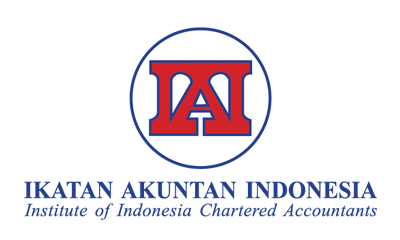Peran Pertumbuhan Ekonomi Dan Penerimaan Dalam Negeri Pada Tingkat Kebahagiaan Masyarakat Dengan Ketimpangan Sebagai Variabel Mediasi
Abstract
Keywords
Full Text:
PDFReferences
Abdelaty Hasan Esmail, H., & Shili, N. N. J. (2018). The Relationship between Happiness and Economic Development in KSA: Study of Jazan Region. Asian Sosial Science, 14(3), 78. https://doi.org/10.5539/ass.v14n3p78
Alamanda, A. (2021). the Effect of Economic Growth on Income Inequality:Panel Data Analysis From Fifty Countries. Info Artha, 5(1), 1–10. https://doi.org/10.31092/jia.v5i1.1176
Amri,K&Nazzamuddin.(2018). Is There Causality Relationship Between Economic Growth and Income Inequality?: Panel Data Evidence From Indonesia.Eurasian Journal of Economic and Finance 6(2):8-20
Barros,A, T.Dieguez,P.Nunes.2018.How Unemployment May Impact Happiness: A Systematic Review. https://www.researchgate.net/publication/327278691_How_Unemployment_May_Impact_Happiness_A_Systematic_Review?enrichId=rgreq-f6f1e547a5feee111cbee6bd094f064f-XXX&enrichSource=Y292ZXJQYWdlOzMyNzI3ODY5MTtBUzo5NTYyOTI5OTQ3MDMzNjFAMTYwNTAwOTQyNTU0OQ%3D%3D&el=1_x_2&_esc=publicationCoverPdf
Easterlin, R. A. (2015). Happiness and economic growth – the evidence. Global Handbook of Quality of Life: Exploration of Well-Being of Nations and Continents, 14, 283–299. https://doi.org/10.1007/978-94-017-9178-6_12
Easterlin, R. A., & Connor, K. J. O. (2020). DISCUSSION PAPER SERIES The Easterlin Paradox The Easterlin Paradox. 13923.
Easterlin, R. A., & Easterlin, R. A. (2016). Paradox Lost ? 9676.
FAHMI, A. (2019). Keterkaitan Antara Penerimaan Pajak Penghasilan Dan Pbb Terhadap Kesenjangan Pendapatan. Jurnal Akuntansi : Kajian Ilmiah Akuntansi (JAK), 6(1), 39. https://doi.org/10.30656/jak.v6i1.945
Hutchinson, T., Ahmed, I., & Buryi, P. (2017). Impact of income tax on happiness: evidence from the United States. Applied Economics Letters, 24(18), 1277–1279. https://doi.org/10.1080/13504851.2016.1270411
Killingsworth, M. A. (2021). Experienced well-being rises with income, even above $75,000 per year. Proceedings of the National Academy of Sciences of the United States of America, 118(4), 1–6. https://doi.org/10.1073/pnas.2016976118
Li, L., & Shi, L. (2019). Economic growth and subjective well-being: analyzing the formative mechanism of Easterlin Paradox. Journal of Chinese Sociology, 6(1), 1–19. https://doi.org/10.1186/s40711-018-0090-9
Liang, Y., & Shen, J. (2016). Subjective Well-being and Its Determinants in China: An Empirical Study Based on Survey Data. Research in Applied Economics, 8(3), 1. https://doi.org/10.5296/rae.v8i3.9806
Martorano, B. (2018). Taxation and Inequality in Developing Countries: Lessons from the Recent Experience of Latin America. Journal of International Development, 30(2), 256–273. https://doi.org/10.1002/jid.3350
Mikucka, M., & Sarracino, F. (2014). Making economic growth and well-being compatible: the role of trust and income inequality. 59695. http://dial.uclouvain.be/handle/boreal:155191
Nandini, D., & Afiatno, B. E. (2020). Determinants Of Subjective Well-Being: Evidence Of Urban Indonesia. Jurnal Ekonomi Pembangunan, 18(1), 1. https://doi.org/10.22219/jep.v18i1.11687
Najmuddin,Z,dan A.Rizkiyani.2022. Government Spending by Function and Economic Growth in Maluku Utara:I-O Tabel and Panel Data Regression Analysis. Jurnal Perencanaan Pembangunan: The Indonesia Journal of Development Planning 6(1).
Oishi, S., & Kesebir, S. (2015). Income Inequality Explains Why Economic Growth Does Not Always Translate to an Increase in Happiness. Psychological Science, 26(10), 1630–1638. https://doi.org/10.1177/0956797615596713
Rahayu,T.R.(2016). Determinan Kebahagiaan di Indonesia. Jurnal Ekonomi dan Bisnis. 16(1)
Simonova, M. D. (2020). The Economy of Well-Being: Creating Opportunities for People’s Well-Being and Economic Growth. MGIMO Review of International Relations, 13(5), 375–386. https://doi.org/10.24833/2071-8160-2020-5-74-375-386
Sim, A., R. Negara, A. Suryahadi.2015.Inequality, Elite Capture, and Targeting of Social Protection Programs: Evidence from Indonesia.SMERU Working Paper.
Soava, G., Mehedintu, A., & Sterpu, M. (2020). Relations between income inequality, economic growth and poverty threshold: New evidences from eu countries panels. Technological and Economic Development of Economy, 26(2), 290–310. https://doi.org/10.3846/tede.2019.11335
Sodik, J., Febriantikaningrum, B., & Purwiyanta, P. (2021). Analisis Pengaruh Pertumbuhan Ekonomi, Ketimpangan Pendapatan, Dan Indeks Pembangunan Manusia Terhadap Indeks Kebahagiaan Di Indonesia Tahun 2014 Dan 2017. Develop, 5(2), 1–16. https://doi.org/10.25139/dev.v5i2.4171
Wibowo, M. (2016). Kebijakan Pembangunan Nasional: dari Pertumbuhan (Growth) Menuju Kebahagiaan (Happiness). Asy-Syir’ah Jurnal Ilmu Syari’ah Dan Hukum, Vol.50(No.1), 1–17.
DOI: https://doi.org/10.35591/wahana.v26i1.479
Wahana: Jurnal Ekonomi, Manajemen dan Akuntansi
ISSN : 2685-1415 (Online) | 1410-8224 (Print)
Published by Pusat Penelitian dan Pengabdian Masyarakat Politeknik YKPN Yogyakarta.
Jl. Gagak Rimang No. 2-4 Balapan, Yogyakarta 55222
Phone (0274) 560159, 562317, 513413, 563516 Fax. (0274) 561591
 This work is licensed under a Creative Commons Attribution-ShareAlike 4.0 International License.
This work is licensed under a Creative Commons Attribution-ShareAlike 4.0 International License.













